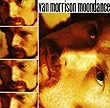 By Daniel Garrett
By Daniel Garrett
Van Morrison, Moondance
Produced by Van Morrison
Warner Bros. Records, 1970
Van Morrison’s singing of the songs on the album Moondance is earthy, rounded, deep, and sensual, especially in the opening mellow, rhythm song with strings and horns, “And It Stoned Me,” a reminiscence of two young men on a fishing excursion interrupted by rain—and when the rain ends they get a truck ride to the swimming hole and later, on their way home, a neighbor gives them a drink: it is a song about pleasure, feeling at one with the world; a song of deep refreshment. Yet, the secret of that song might be a lingering, thoughtful melancholy (melancholy and pleasure can be part of the same experience). Moondance, featuring songs such as “Moondance,” “Crazy Love,” “Caravan,” and “Into the Mystic,” is a great album. The energy in the song “Moondance” is in the singing, the piano, the saxophone, and the flute; and the energy is dazzling. “Well, it’s a marvelous night for a Moondance, with the stars up above in your eyes,” sings Van Morrison, a guitarist, amid the jazz rhythm, percussion, and flute of “Moondance.” While Jeff Labes plays piano, Jack Schrorer saxophone, Collin Tillton flute, and Garry Malabar drums, Van Morrison’s singing is fast, light, sprightly; and it is one of his most likable songs, with an exuberance that enters the listener’s spirit. “All the night’s magic seems to whisper and hush,” he sings. The piano playing is playful and speculative, perfectly so. “She give me love, love, love, love, crazy love,” Morrison sings in the refrain of “Crazy Love,” an intimate, gentle, tender, soulful song with voice and chorus. His hushed singing suggests wonder; and it is singing that bridges genders, ethnicities. The song’s arrangement is spare but fine; and care is perceptible. “She take away my trouble, take away my grief,” Morrison sings.
The Belfast-born George Ivan Morrison grew up loving jazz and blues recordings; and as a boy Van Morrison learned how to play guitar, saxophone and harmonica, and he quit school to play music, even traveling in Europe, before returning to Belfast, where he started a music club. His band Them achieved some popularity in the mid-1960s, but he was soon performing alone, launching his solo career with “Brown Eyed Girl” in 1967. Morrison created the experimental album Astral Weeks in 1968, and then Moondance in 1970. There is freedom perceptible in the mood of Moondance. (Of course, liquor and marijuana are as likely sources for the vibe as is meditation.) With a sultry, shuffling beat and sensuous rhythm, and with each note of the beautiful guitar playing clear, a relaxed communal scene is created in Moondance’s “Caravan,” a festive song of memory and friendship and pleasure. The opening bars create a momentum that the simple refrain fulfills; and the pattern is satisfyingly repeated. The call and response of voice and music in “Caravan” adds drama; and the changes in the tone of Morrison’s voice recreates living human experience. With its lyric appreciation of nature, of wind and sun and sea, the composition “Into the Mystic” easily suggests a change in consciousness, if not other spiritual realms, and the tune has a rhythm that is dense and appealing, and as on most of the album the mood is relaxed and sensual and soulful. There is a great deal of simple intimacy in Van Morrison’s songs. “Put away all your walking shoes, then you come running to me,” he sings in “Come Running.” With its busy arrangement, “Come Running” is enthusiastic, rambunctious. It has a spinning, spiraling energy to which it is easy to imagine people swirling in dance. The composition “These Dreams of You” sounds a bit like folk music (is there a fiddle or banjo?), but it is ultimately the horn-laden serenade of rhythm-and- blues. Morrison’s voice can sound rough, grasping, but that does not repel the listener, as it is an expressive and natural tone rather than a calculated or forced one. Van Morrison’s focus on character, emotion, act, and memory turns experience into a kind of romance.
Van Morrison followed Moondance with His Band and the Street Choir (1970), Tupelo Honey (1971), St. Dominic’s Preview (1972), Hard Nose the Highway (1973), and other albums, with Wavelength (1978) and Poetic Champions Compose (1987) being favorites of mine among those. Morrison sometimes performed with old blues singers and jazz musicians, and has performed country songs, as well as traditional Irish tunes. His work on Moondance remains a pinnacle of his artistry; and it demonstrates that Van Morrison has been singing the music of the soul from his very beginning. With voice and chorus, the downbeat rhythm-and-blues of “Brand New Day” on Moondance is about change, awakening and awareness: “I see my freedom from across the way, and it comes right in on time,” whereas “Everyone,” which has what sounds like an old English musical introduction, and with lyrics following that mention pipes and drum, could be a score for a musical ride, and “Glad Tidings,” with its clapping, propelling beat and horns, somewhat Spanish in tone, is a light piece. In “Everyone,” Van Morrison sings “We’ll make dreams come true—if we want them to…”
Daniel Garrett, a graduate of the New School for Social Research, and the principal organizer of the Cultural Politics Discussion Group at Poets House, is a writer whose work has appeared in The African, All About Jazz, American Book Review, Art & Antiques, The Audubon Activist, Black Film Review, Changing Men, Cinetext, Contact II, Film International, The Humanist, Hyphen, Illuminations, Muse Apprentice Guild, Option, Pop Matters, Quarterly Black Review of Books, Rain Taxi, Red River Review, Review of Contemporary Fiction, Wax Poetics, and World Literature Today. Daniel Garrett has written extensively about international film for Offscreen, and comprehensive commentary on music for The Compulsive Reader. He has an internet log, “The Art Notes of a Solitary Walker,” focused on visual art. He has written a novel, A Stranger on Earth.